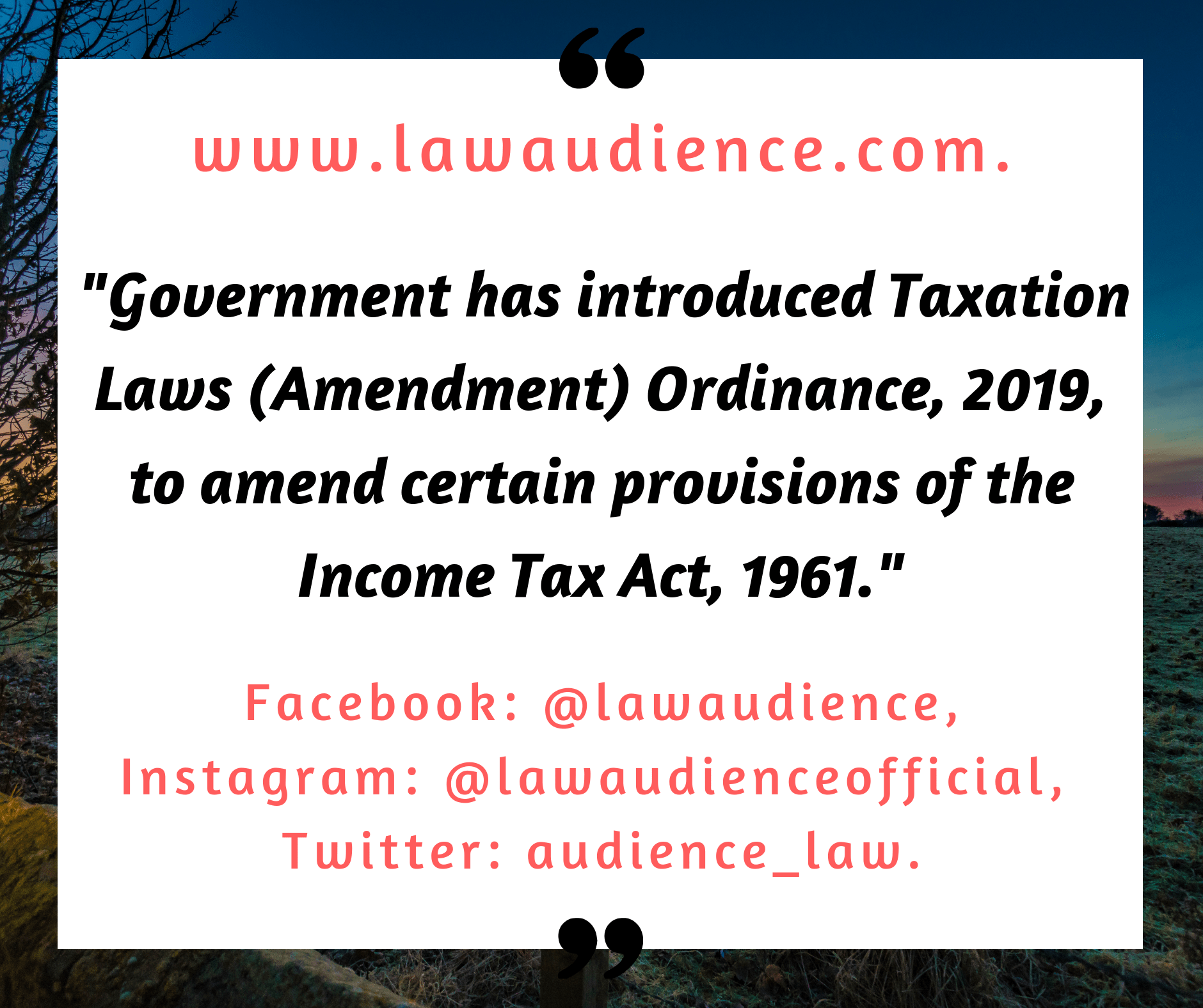I. TAXATION LAWS (AMENDMENT) ORDINANCE 2019:
The present Government has introduced an Ordinance, i.e, Taxation Laws (Amendment) Ordinance, 2019. The sole purpose of Taxation Laws (Amendment) Ordinance, 2019 is to amend a few provisions of the Income Tax Act, 1961. The Finance Minister, i.e., Smt Nirmala Sitaraman, today in a press conference held in Goa announced the same. The Finance Minister talked about some important features or provisions of the Taxation Laws (Amendment) Ordinance 2019. The total revenue foregone for the reduction in corporate tax rate and other relief estimated at Rs. 1,45,000 crore.
Some of the important provisions of the Taxation Laws (Amendment) Ordinance 2019 are listed below[1]:
- Inclusion of a new provision in the Income Tax Act, 1961, with effect from Financial Year 2019-20. This provision allows any domestic company to exercise an option to pay the Income Tax at the rate of 22%. But this option comes with a pre-attached-condition that such domestic company shall not avail any exemption/incentive. The effective tax rate for these domestic companies is kept at 25.17%. The effective tax rate includes the following things namely, surcharge & cess. It is also provided that these domestic companies shall not be required to pay the Minimum Alternative Tax.
- The second important feature or provision of this Taxation Laws (Amendment) Ordinance, 2019, is that to gain fresh investment in the manufacturing sector and to enhance the ‘Make in India’ scheme the government has added a new provision in the Income tax Act, 1961, with effect from Financial Year 2019-20. This newly introduced provision shall allow any newly incorporated domestic company on or after 1st October 2019, willing to make fresh investment in the manufacturing sector, an option to pay the Income Tax at the rate of 15%. But this option also comes with a pre-attached-condition that such domestic company shall not avail any exemption/incentive and their production on or before 31st March 2023. The effective tax rate for these domestic companies is kept at 17.01%. The effective tax rate includes the following things namely, surcharge & cess. It is also provided that these domestic companies shall not be required to pay the Minimum Alternative Tax.
- Any domestic company which will not avail the benefits of these amended provisions shall continue to pay the tax at the pre-amended rate. But still these domestic companies after the expiration of their tax holiday/exemption period can avail the benefits of the amended provisions. If they choose to avail the benefits of the amended provisions then they cannot withdrawn the same. It means that after that they shall be liable to continue with the benefits introduced by the amended provisions. But if after the expiration of their tax holiday/exemption period they choose not to opt for the benefits introduced by amended provisions and continue to avail the exemption then the Minimum Alternative tax rate will be 15% instead of 18.5%.
- To maintain the flow of funds in the Capital Market, the amended provisions provide that the surcharge introduced by the Finance (No. 2) Act, 2019, shall not apply on capital gains. Such Capital gain must be an outcome of the following things namely, sale of equity share in a company or a unit of an equity oriented fund or a unit of a business trust liable for securities transaction tax, in the hands of an individual, HUF, AOP, BOI and AJP.
- The enhanced surcharge shall also not apply to capital gains arising on sale of any security including derivatives, in the hands of Foreign Portfolio Investors (FPIs).
- In order to provide relief to listed companies which have already made a public announcement of buy-back before 5th July 2019, it is provided that tax on buy-back of shares in case of such companies shall not be charged.
- The Government has also decided to expand the scope of CSR 2 percent spending. Now CSR 2% fund can be spent on incubators funded by Central or State Government or any agency or Public Sector Undertaking of Central or State Government, and, making contributions to public-funded Universities, IITs, National Laboratories and Autonomous Bodies (established under the auspices of ICAR, ICMR, CSIR, DAE, DRDO, DST, Ministry of Electronics and Information Technology) engaged in conducting research in science, technology, engineering and medicine aimed at promoting SDGs.
[1] Read the official notification available at https://pib.gov.in/PressReleseDetail.aspx?PRID=1579811.
Post Views: 1,586



